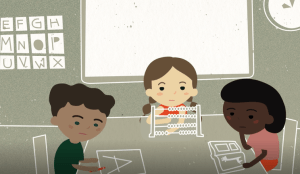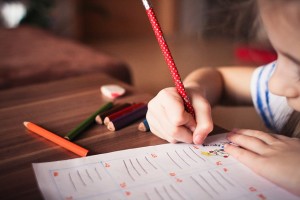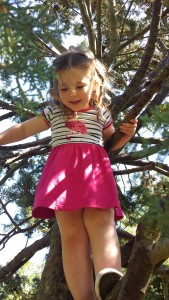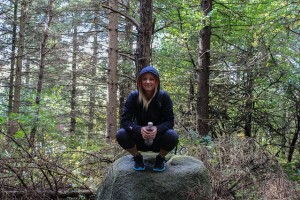
On 12th May 2016, thanks to Holyrood magazine, a fictional baby called Kirsty was born in one of Scotland’s most deprived communities. In a letter introducing Kirsty, Holyrood’s editor challenges all Scottish parliamentarians to improve her life chances over the next five years. Closing the attainment gap is, of course, central to this aim. And five years from now, Kirsty will be just about to start school.
Kirsty meets the three Rs
 Let’s assume that all goes to plan and Kirsty sits the P1 national assessment. Armed with this information on her pupils’ literacy and numeracy ‘readiness’, Kirsty’s teacher can get started on the three Rs. With twenty-odd small children cooped up in a confined space – all at very different developmental stages, and many far from ready to settle down behind a desk – this isn’t an easy task so her school probably groups pupils by ability. And, since disadvantaged children usually lag behind their more fortunate peers in most aspects of development, including those underpinning academic ‘readiness’, Kirsty has an above-average chance of of ending up in the ‘slow group’.
Let’s assume that all goes to plan and Kirsty sits the P1 national assessment. Armed with this information on her pupils’ literacy and numeracy ‘readiness’, Kirsty’s teacher can get started on the three Rs. With twenty-odd small children cooped up in a confined space – all at very different developmental stages, and many far from ready to settle down behind a desk – this isn’t an easy task so her school probably groups pupils by ability. And, since disadvantaged children usually lag behind their more fortunate peers in most aspects of development, including those underpinning academic ‘readiness’, Kirsty has an above-average chance of of ending up in the ‘slow group’.
This doesn’t bode well. Despite the anodyne names teachers give to ability groups, five-year-old children quickly work out which is ‘top’ and which ‘bottom’. And this early academic ranking soon affects their self-image as learners, their attitude to school … and the school’s attitude to them. It’s well-established that an unintended consequence of a too-early focus on academic work is the creation of self-fulfilling prophecies.
 However, Kirsty may be lucky. She was born in May, so by August 2021 she’ll be five and a quarter years old. Many of her classmates, born during the winter months, will be only four. At this stage in development, even six months can make a big difference (especially if it’s meant longer in nursery, being primed for ‘school readiness’), so being one of the oldest in the class should give Kirsty an edge in the P1 assessment. There’s a chance our Holyrood baby will perform well enough to avoid the ‘slow group’.
However, Kirsty may be lucky. She was born in May, so by August 2021 she’ll be five and a quarter years old. Many of her classmates, born during the winter months, will be only four. At this stage in development, even six months can make a big difference (especially if it’s meant longer in nursery, being primed for ‘school readiness’), so being one of the oldest in the class should give Kirsty an edge in the P1 assessment. There’s a chance our Holyrood baby will perform well enough to avoid the ‘slow group’.
She’s also lucky – at least in the short term – in having been born female. Girls are generally more socially aware than boys from birth and therefore quicker to develop social skills, including language. They’re also more likely to be able to sit still and do as they’re told in order to please the teacher, so less inclined to exhibit the ‘challenging behaviour’ that rapidly gets many disadvantaged boys a bad reputation in the staffroom. If Kirsty is a typical representative of her sex, she may adapt relatively easily to classroom life, pick up the basics of the three Rs and make good progress at primary school.
Unfortunately, it’s not just children’s academic trajectory that’s affected by an early start on formal schooling. Between the ages of three and seven, they’re still developing habits of mind and behaviour that will underpin their feelings of self-confidence and self-efficacy throughout life. Kirsty’s compliance with developmentally-inappropriate, adult-imposed norms at an extremely formative age is likely to affect her long-term attitudes and behaviour in ways that could leave her psychologically fragile in years to come. For instance, there’s a good chance she’ll be overly compliant, self-critical, dependent on extrinsic rewards and lacking in resilience.
What if Kirsty went to kindergarten?
 Now if Kirsty were really lucky, she’d have been born in a country with a play-based kindergarten stage for three- to seven-year-olds. There she’d have time, space, support from well-trained staff and copious opportunities to be outdoors and active during her formative early years. She’d be free to explore, experiment and develop personal strengths such as self-reliance and problem-solving skills. She’d have the chance to listen to plenty of stories, join in with songs and music-making, take part in art and craft activities, play, talk, investigate, imagine and create. Four years of early play-based education can give every child – male or female, rich or poor – the best possible chance of developing a love of learning, a strong sense of self-efficacy and the emotional resilience to cope with challenges and bounce back from adversity throughout the rest of their lives.
Now if Kirsty were really lucky, she’d have been born in a country with a play-based kindergarten stage for three- to seven-year-olds. There she’d have time, space, support from well-trained staff and copious opportunities to be outdoors and active during her formative early years. She’d be free to explore, experiment and develop personal strengths such as self-reliance and problem-solving skills. She’d have the chance to listen to plenty of stories, join in with songs and music-making, take part in art and craft activities, play, talk, investigate, imagine and create. Four years of early play-based education can give every child – male or female, rich or poor – the best possible chance of developing a love of learning, a strong sense of self-efficacy and the emotional resilience to cope with challenges and bounce back from adversity throughout the rest of their lives.
This is why Scotland’s Curriculum for Excellence endorses a kindergarten-type approach for the under-sevens. Sadly, its principles have not yet been put into practice in the majority of primary schools because, owing to our historically early school starting age, parents and politicians expect children to crack on with the three Rs from the age of five.
And according to John Stodler, General Secretary of the Association of Directors of Education Scotland (ADES), present government policy can only intensify these attitudes. In a recent interview with the TESS, he explained that councils would ‘philosophically’ be in favour of introducing a kindergarten stage but it’s now right off the cards. ‘Local authorities’ priority will be attainment and closing the gap,’ he said. ‘This will make them less likely to do something radical or creative or depart significantly from early reading and early numeracy skills.’
What’s the future like for Kirsty?
 So, even if Kirsty gets off to the best possible start, she’s unlikely to fulfil her true potential in the long-term. In an increasingly image-obsessed, gender-stereotypical culture, all girls need deep-seated self-confidence and resilience to see them through the pressures of twenty-first century adolescence. Disadvantaged girls need these personal strengths in trumps because they’re facing the additional challenges of poverty. At present, an alarming 80% of all fifteen-year-old girls in Scotland are suffering from school-related stress and associated health problems. Given her socio-economic circumstances, there’s good reason to fear that Kirsty will eventually join the swelling ranks of teenagers with diagnosable mental health conditions.
So, even if Kirsty gets off to the best possible start, she’s unlikely to fulfil her true potential in the long-term. In an increasingly image-obsessed, gender-stereotypical culture, all girls need deep-seated self-confidence and resilience to see them through the pressures of twenty-first century adolescence. Disadvantaged girls need these personal strengths in trumps because they’re facing the additional challenges of poverty. At present, an alarming 80% of all fifteen-year-old girls in Scotland are suffering from school-related stress and associated health problems. Given her socio-economic circumstances, there’s good reason to fear that Kirsty will eventually join the swelling ranks of teenagers with diagnosable mental health conditions.
Parliamentarians, please take note. The attainment gap will not be closed by an increasing focus on literacy and numeracy skills in the early years. Educational success is inextricably interwoven with health and well-being. In a culture where young children have fewer opportunities for active outdoor play than ever before in human history, all Scottish children would benefit from a kindergarten stage. But the ones with most to gain from the ‘gift of time’ for all-round development are children, like Kirsty, who are raised in poverty.
Sue Palmer
See Upstart: the case for raising the school starting age and providing what the under-sevens really need (Floris Books) for further details about how early years education can widen or narrow the poverty and gender gaps.

